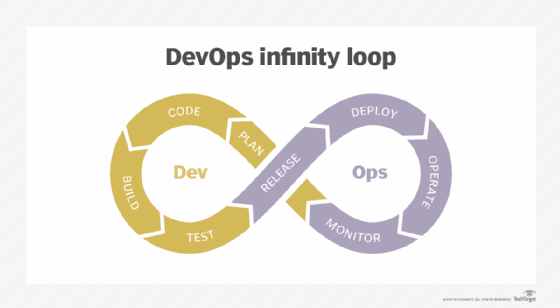Build a DevOps culture using these key principles
Is your organization ready to adopt DevOps practices? There's a lot to it, so don't try to accomplish everything all at once. Start with these key ideas.
DevOps culture is holistic, driven by the belief that the whole is more important than the parts. The DevOps mentality casts aside the notion of silos or individual teams. Accordingly, organizations that buy into the culture place stock in entire processes and central goals. This flies in the face of traditional business, where each department and even team member has their own set tasks.
The DevOps approach is about collective action -- IT staffers quickly solve problems and continuously learn about wider aspects of the business. These are the Three Ways principles described in The DevOps Handbook by co-authors Gene Kim, Jez Humble, Patrick Debois and John Willis.
Envision routine DevOps work. Time -- but hopefully not too much time -- is devoted to the handling of immediate problems. Ideally, DevOps allows workers to devote most of their time to refining processes such as device management, network security, application governance and patches. This push for continuous improvement is a hallmark of DevOps culture.
Companies tend to be creatures of habit, sticking with the familiar and comfortable. When a process proves effective, a business will lean on that. DevOps teams, meanwhile, are tasked with squeezing every last drop of efficiency from a given set of processes. They must also ensure their end products are stable, performant and secure.

Success in these pursuits requires:
- A willingness to experiment and challenge the status quo;
- Accountability when problems arise; and
- The ability to learn from mistakes and improve on the fly.
What is a DevOps culture?
A major shortcoming of traditional corporate culture is fear-based management, in which punishment can too easily get in the way of ideas that might lead to growth.
Conversely, the DevOps culture welcomes failure -- especially when it arrives quickly. Successful DevOps teams don't seek to assign blame; they aren't focused on fallout. Instead, they focus on a pipeline of continuous delivery, a feedback loop, rapid fixes and continuous integration.
Stagnation festers within even the best organizations. Don't rest on your laurels. The DevOps culture preaches that teams must devote time to innovate and question current procedures. This attitude is not simply for the sake of contrarianism but rather because it often leads to creative solutions.
Teams should look for ways to streamline software development, knowing that time saved can be reallocated to the creation of new features or entire applications.
Build a successful DevOps culture
To create a DevOps culture, especially a healthy one, everyone needs to play their part. So, what actions can foster that type of culture?
- Collaborate openly. This might mean assigning multiple teams to key projects. These don't have to be large teams, but they should gradually grow. This form of collaboration prevents teams from becoming siloed. Togetherness promotes communication -- in person and remotely. This encourages stellar results. Use common messaging channels. Invite multiple teams to your Kanban boards or Jira dashboards. Create a central hub where multiple teams can review monitoring data.
- Embrace business process automation. BPA is an effective way to address complex workflows. DevOps practices aim to streamline processes, following the mantra that a thing that is done multiple times should be automated -- especially a repetitive task that requires little analytical thinking. Humans tend to establish somewhat proprietary workflows based on their preferences, so automation will boost consistency across the organization. Be careful not to automate everything simultaneously; start with one or two core processes. These small victories add up, and they will inspire confidence to experiment further over time.
- Remember that quality is paramount. Everything your organization produces should meet customer expectations and provide a satisfying user experience. Just as physical products shouldn't have tangible defects, software shouldn't be riddled with bugs. The DevOps process is keen on reducing silly mistakes, and the better your processes become, the greater the results will be with the final release. In addition to boosting quality-control efforts, these tactics can even improve your time to market.
A DevOps mentality takes time
Large-scale change across most organizations should happen gradually. Otherwise, you generate resistance or confusion. Disturbing groupthink too quickly leads to culture shock.
A shift to DevOps culture requires buy-in at all levels of the organizational structure, from developers to systems administrators to security professionals. Teams must understand both the long-term and short-term benefits of DevOps. They'll need to be shown how processes will change. Be sure to document and communicate these changes clearly to everyone.
Unless colleagues see that DevOps' core values -- efficiency, adaptability, ongoing education and unity -- align with their own, productivity will suffer and more detrimental consequences are likely.
Teams that already subscribe to the Agile methodology are ideal testbeds for this cultural shift. After all, DevOps teams favor quick and proactive actions over slow and reactive ones.
The DevOps culture prioritizes objective improvements over subjective and selfish approaches. Developing a team-first ethos will unlock higher productivity, and general improvements at all project phases. Though the shift might not be instantaneous, the results should be unquestionably positive.







